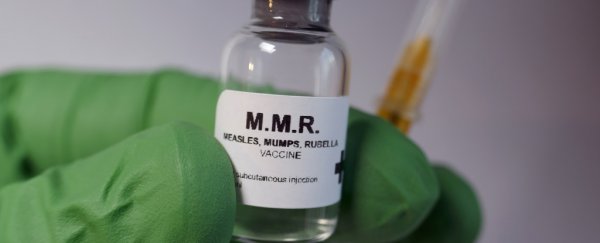The United States has reported 971 cases of measles in the first five months of 2019, the greatest number since 1992, when 2,126 cases were reported for the entire year, federal health officials said Thursday.
The agency has typically been updating its measles cases weekly, on Mondays, but announced the case count Thursday because it had reached this new milestone.
The biggest source of this year's surging measles cases is New York, where Rockland County and New York City have been battling outbreaks for nearly eight months.
The two jurisdictions account for the majority of the cases this year, with a total of 643. The outbreaks have been concentrated in the ultra-Orthodox Jewish community.
Officials have blamed anti-vaccine groups for spreading misinformation about vaccine safety and the danger of measles. If these outbreaks continue through the summer and fall, health officials said, the United States could lose a key public-health achievement: the elimination of measles.
A country is considered to have eliminated measles when there has been an absence of continuous spread of the disease for more than a year.
The United States achieved that status in 2000 through a massive sustained effort to vaccinate children. If this year ends that accomplishment, it would be an enormous public-health loss, experts said.
"It means that a really very harmful infection had been eliminated, but we have now let it back into our country, and it is a threat to our babies and young children as they grow up," said William Schaffner, an infectious-disease professor at Vanderbilt University who has taken care of measles patients.
Globally, the highly contagious disease continues to be one of the leading causes of death among young children, despite the fact that there is a safe and effective vaccine to prevent it. There is no specific antiviral treatment against the measles virus.
Before the introduction of measles vaccine in 1963, major epidemics occurred every two to three years and measles caused an estimated 2.6 million deaths each year.
In the United States, before widespread use of the vaccine, an estimated 3 to 4 million people got measles each year, including 48,000 who were hospitalized and an estimated 400 to 500 who died, many of them children.
Measles had been eliminated throughout the entire Western Hemisphere, but now Venezuela and the United States are battling outbreaks, Schaffner said. In Venezuela, the public-health infrastructure has collapsed because of economic and political turmoil.
But in the United States, anti-vaccine groups and others who are skeptical about vaccines have played the dominant role in suppressing immunization rates, he said.
"We have the withholding of children from measles immunizations by parents in many parts of the country," he said.
"This is not an access issue. These are middle-class populations with access to medical care. They're withholding children from standard, routine pediatric health care."
The result, he said, "is we now have continuing sustained transmission of measles."
CDC Director Robert Redfield said vaccination is the way to end the outbreak.
"Again, I want to reassure parents that vaccines are safe; they do not cause autism," he said. "The greater danger is the disease that vaccination prevents. Your decision to vaccinate will protect your family's health and your community's well-being."
Loss of the measles elimination status would be "a huge blow for the nation and erase the hard work done by all levels of public health," the CDC said in a statement.
2019 © The Washington Post
This article was originally published by The Washington Post.

